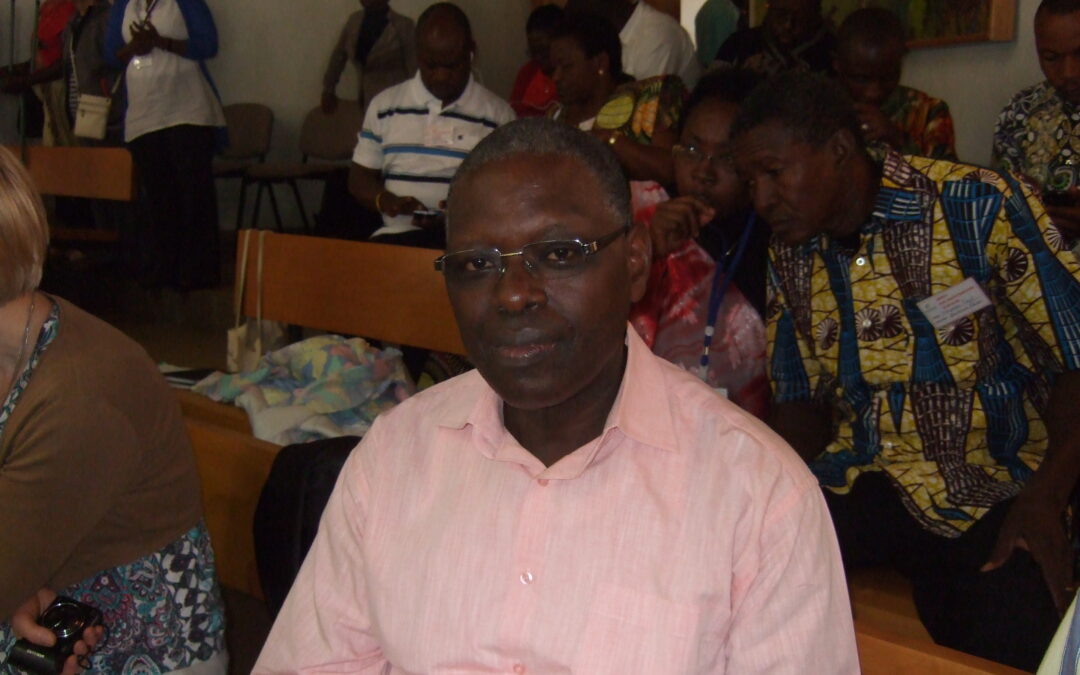
May 27, 2016 | Focolare Worldwide
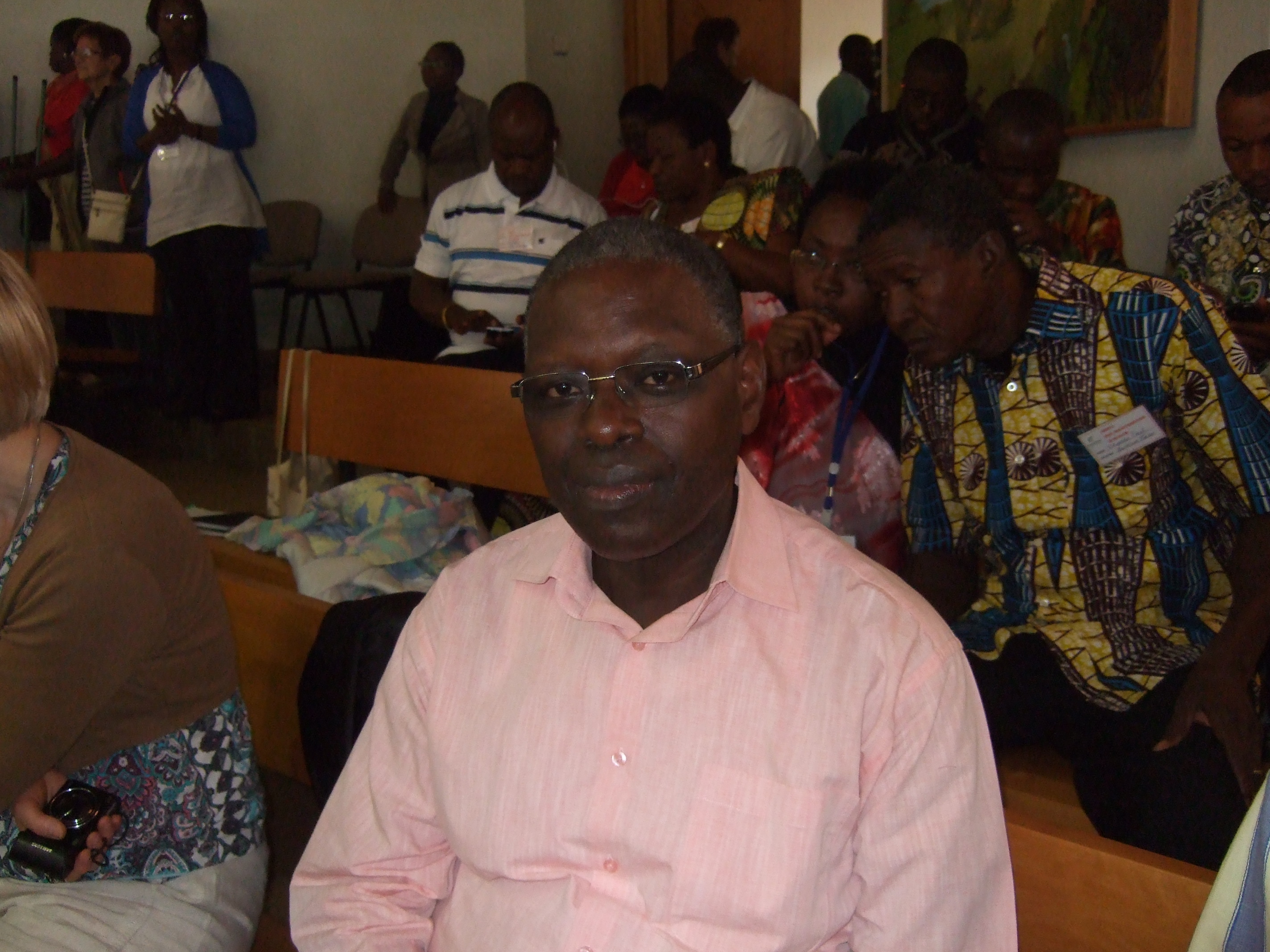 Several concerns were raised during the School of Inculturation, regarding those aspects of the modern world that can overshadow basic African cultural values. Yet, progress and development can never be stopped. In your opinion, what is the way to salvage the values that are contained in the traditions? “I actually think that development can not be avoided. The culture of tradition in African cultures is also always changing. However, modernity does penetrate African traditions with such things as materialism, individualism and the primacy of money and capitalism. I don’t say that money is bad, but the wrong use of money makes us put aside our humanity which in Africa we refer to as ubuntu. But modernity also contains some positive aspects: democracy, human rights, pluralism that leads to the acceptance others and their differences. In some African countries people kill for lack of pluralism; there is a collective sense of self that is very dangerous. In that sense, individualism – a Western value – does not seem entirely negative because if I wish to escape from the collective sense of self, it will take a good dose of individualism. In short, I think there is need for a balance between individualism and pluralism. It’s important to become aware of this and reflect upon it, even though it’s not sufficient in itself.” I think we should illumine the African culture that has been contaminated by the negative values of modernity. I think that this is the point when Christianity must intervene, which looks upon the other person as my path to sanctification. The Gospel invites us to give money the second place. Jesus gives the human person first place, the neigbour. For me this is important, it seems to me the path for salvaging the universal values that are contained in the traditions.” What impressions do you take away with your from these days? What are the challenges to be faced in the daily lives of the African peoples? “Through one simple situation that I found myself in I felt that I could be reborn in these days, like Nicodemus. It was my beginning of the School of Inculturation. The second striking impression was to see the people who are here, to discover that Africa is pluralistic, that there is a pluralism of Africas. I wanted to know every one of them, to understand how they live; to talk with a Cameroonian, who is quite different from a Burundian, a Rwandian, or Ethiopian. Here I experienced Africa’s pluralism. But as Africans, we come together on certain values: solidarity, the family and family relationships, communion, the centrality of our children’s education. This is important for us Afrcicans, even though we are so diverse. For me, the challenge for defeating the internal battles, passes through the incarnation of the words of the Gospel in daily life, social and political life. This is the challenge that rises from these days: When we get home, how will we behave towards people that are different from us? How will we behave towards our enemies? Towards the people who do not belong to my political party, who don’t appreciate me? Will I be capable of loving them? Will I be this pure white light of the Gospel, in society, politics, in the lack of understanding among groups of the same nation? This is the commitment I take away with me: the challenge of our times for overcoming the great problems of Africa.” Compiled by Irena Sargankova
Several concerns were raised during the School of Inculturation, regarding those aspects of the modern world that can overshadow basic African cultural values. Yet, progress and development can never be stopped. In your opinion, what is the way to salvage the values that are contained in the traditions? “I actually think that development can not be avoided. The culture of tradition in African cultures is also always changing. However, modernity does penetrate African traditions with such things as materialism, individualism and the primacy of money and capitalism. I don’t say that money is bad, but the wrong use of money makes us put aside our humanity which in Africa we refer to as ubuntu. But modernity also contains some positive aspects: democracy, human rights, pluralism that leads to the acceptance others and their differences. In some African countries people kill for lack of pluralism; there is a collective sense of self that is very dangerous. In that sense, individualism – a Western value – does not seem entirely negative because if I wish to escape from the collective sense of self, it will take a good dose of individualism. In short, I think there is need for a balance between individualism and pluralism. It’s important to become aware of this and reflect upon it, even though it’s not sufficient in itself.” I think we should illumine the African culture that has been contaminated by the negative values of modernity. I think that this is the point when Christianity must intervene, which looks upon the other person as my path to sanctification. The Gospel invites us to give money the second place. Jesus gives the human person first place, the neigbour. For me this is important, it seems to me the path for salvaging the universal values that are contained in the traditions.” What impressions do you take away with your from these days? What are the challenges to be faced in the daily lives of the African peoples? “Through one simple situation that I found myself in I felt that I could be reborn in these days, like Nicodemus. It was my beginning of the School of Inculturation. The second striking impression was to see the people who are here, to discover that Africa is pluralistic, that there is a pluralism of Africas. I wanted to know every one of them, to understand how they live; to talk with a Cameroonian, who is quite different from a Burundian, a Rwandian, or Ethiopian. Here I experienced Africa’s pluralism. But as Africans, we come together on certain values: solidarity, the family and family relationships, communion, the centrality of our children’s education. This is important for us Afrcicans, even though we are so diverse. For me, the challenge for defeating the internal battles, passes through the incarnation of the words of the Gospel in daily life, social and political life. This is the challenge that rises from these days: When we get home, how will we behave towards people that are different from us? How will we behave towards our enemies? Towards the people who do not belong to my political party, who don’t appreciate me? Will I be capable of loving them? Will I be this pure white light of the Gospel, in society, politics, in the lack of understanding among groups of the same nation? This is the commitment I take away with me: the challenge of our times for overcoming the great problems of Africa.” Compiled by Irena Sargankova
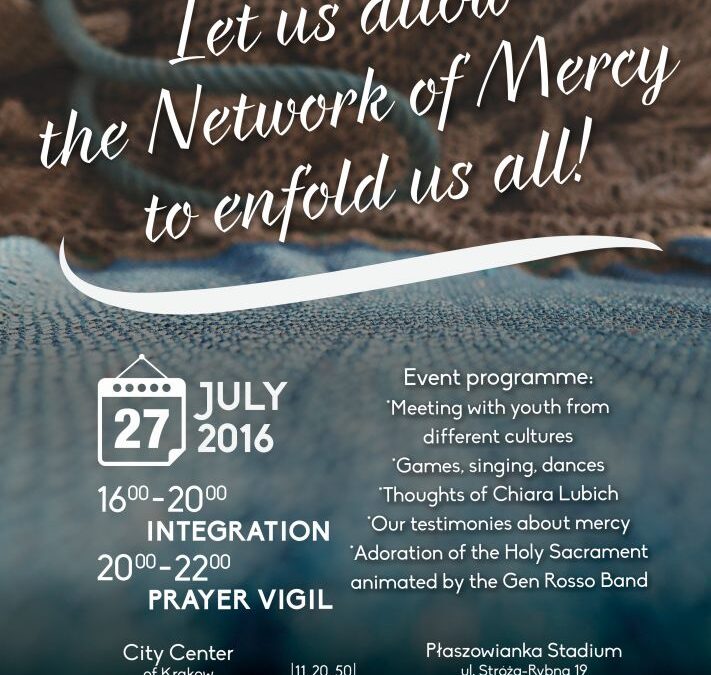
May 26, 2016 | Focolare Worldwide
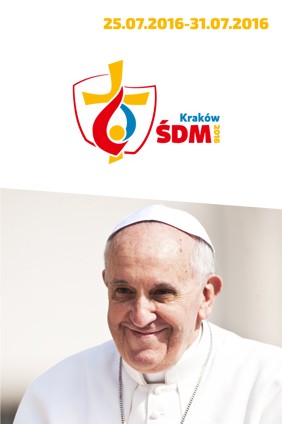 “Blessed are the merciful for they will receive mercy” is the theme of the 31st World Youth Day. “Read the Beatitudes, they will do you a lot of good,” Pope Francis had said to the youth in Rio de Janeiro in 2013, and it was precisely along these lines of the beatitudes that the participants of the WYD are preparing for the event, as part of the Jubilee of Mercy, in a land which – through Sr. Faustina and John Paul II – is strongly linked to the devotion to the Divine Mercy. Among the main events are the Opening Mass (26.07), Welcome Ceremony with the first meeting with the Holy Father (28.07), Stations of the Cross of the World Youth (29.07), to then get to the heart of the WYD: the Wake with the Holy Father (30.07) and Closing Mass (31.07). The programme will be enriched with the catechism sessions in various languages and the Youth Festival, with four spiritual soirees to be matched with artistic-cultural expressions. Also the youth of the Focolare Movement are giving a hand in the WYD preparations, particularly with an event to be held in the context of a Festival in Kracow on 27 July 2016, Sports Club Plaszowianka ul. Stroza-Rybna 19 (tram stop 50, 20, 11). The evening, according to Magda, one of the organizers, will be composed of two parts: “The first will start at 4 pm, with the integration that will help us to know each other better, with dances and game from all over the world. From 8 pm the wake will help us deepen the theme of the works of mercy through experiences, songs, choreographies and writings of Chiara Lubich. All will end with the adoration of the Eucharist.» Magda further explains: «The wake will be enlivened by the international Gen Rosso band – and we want it to be a moment of deep union with God and among us. We want this programme to be a moment of encounter, to overcome all the differences that may divide us.” The organizers continued by saying that the youth of the Focolare will also manage a stand in the Vocational Centre (to be open all week at the Kracow Stadium), which will exhibit all the various initiatives of the ecclesial panorama, to help the youth ponder “what does God expect of me?” “The WYD 2016 is quickly nearing!» Magda wrote, «And we also met last 30 April to 3 May in Kracow, to set out the programme of the Youth Festival. In this meeting we prayed to the Holy Spirit to guide us. We are looking forward to the next step in the Fiore Mariapolis (the Polish town of the Focolare) on 11/12 June, on the occasion of the 20th anniversary of our town. Please support us with your prayers!». Magda also invited all the youth saying: «If you intend to come to Kracow for the WYD and wish to give us a hand, you are most welcome! We shall await your proposals sent to the address: krakow2016@focolare.org. Let us allow the network of Mercy to enfold us all!” Those who wish to go deeper into the WYD experience in the light of the Focolare spirituality will be able to do so by participating in the “post WYD school” in Slovakia (Jasná – Demänovská Dolina) with 550 youths coming from all over the world, among which will also be a group of 50 Orthodox youth. Maria Chiara De Lorenzo
“Blessed are the merciful for they will receive mercy” is the theme of the 31st World Youth Day. “Read the Beatitudes, they will do you a lot of good,” Pope Francis had said to the youth in Rio de Janeiro in 2013, and it was precisely along these lines of the beatitudes that the participants of the WYD are preparing for the event, as part of the Jubilee of Mercy, in a land which – through Sr. Faustina and John Paul II – is strongly linked to the devotion to the Divine Mercy. Among the main events are the Opening Mass (26.07), Welcome Ceremony with the first meeting with the Holy Father (28.07), Stations of the Cross of the World Youth (29.07), to then get to the heart of the WYD: the Wake with the Holy Father (30.07) and Closing Mass (31.07). The programme will be enriched with the catechism sessions in various languages and the Youth Festival, with four spiritual soirees to be matched with artistic-cultural expressions. Also the youth of the Focolare Movement are giving a hand in the WYD preparations, particularly with an event to be held in the context of a Festival in Kracow on 27 July 2016, Sports Club Plaszowianka ul. Stroza-Rybna 19 (tram stop 50, 20, 11). The evening, according to Magda, one of the organizers, will be composed of two parts: “The first will start at 4 pm, with the integration that will help us to know each other better, with dances and game from all over the world. From 8 pm the wake will help us deepen the theme of the works of mercy through experiences, songs, choreographies and writings of Chiara Lubich. All will end with the adoration of the Eucharist.» Magda further explains: «The wake will be enlivened by the international Gen Rosso band – and we want it to be a moment of deep union with God and among us. We want this programme to be a moment of encounter, to overcome all the differences that may divide us.” The organizers continued by saying that the youth of the Focolare will also manage a stand in the Vocational Centre (to be open all week at the Kracow Stadium), which will exhibit all the various initiatives of the ecclesial panorama, to help the youth ponder “what does God expect of me?” “The WYD 2016 is quickly nearing!» Magda wrote, «And we also met last 30 April to 3 May in Kracow, to set out the programme of the Youth Festival. In this meeting we prayed to the Holy Spirit to guide us. We are looking forward to the next step in the Fiore Mariapolis (the Polish town of the Focolare) on 11/12 June, on the occasion of the 20th anniversary of our town. Please support us with your prayers!». Magda also invited all the youth saying: «If you intend to come to Kracow for the WYD and wish to give us a hand, you are most welcome! We shall await your proposals sent to the address: krakow2016@focolare.org. Let us allow the network of Mercy to enfold us all!” Those who wish to go deeper into the WYD experience in the light of the Focolare spirituality will be able to do so by participating in the “post WYD school” in Slovakia (Jasná – Demänovská Dolina) with 550 youths coming from all over the world, among which will also be a group of 50 Orthodox youth. Maria Chiara De Lorenzo 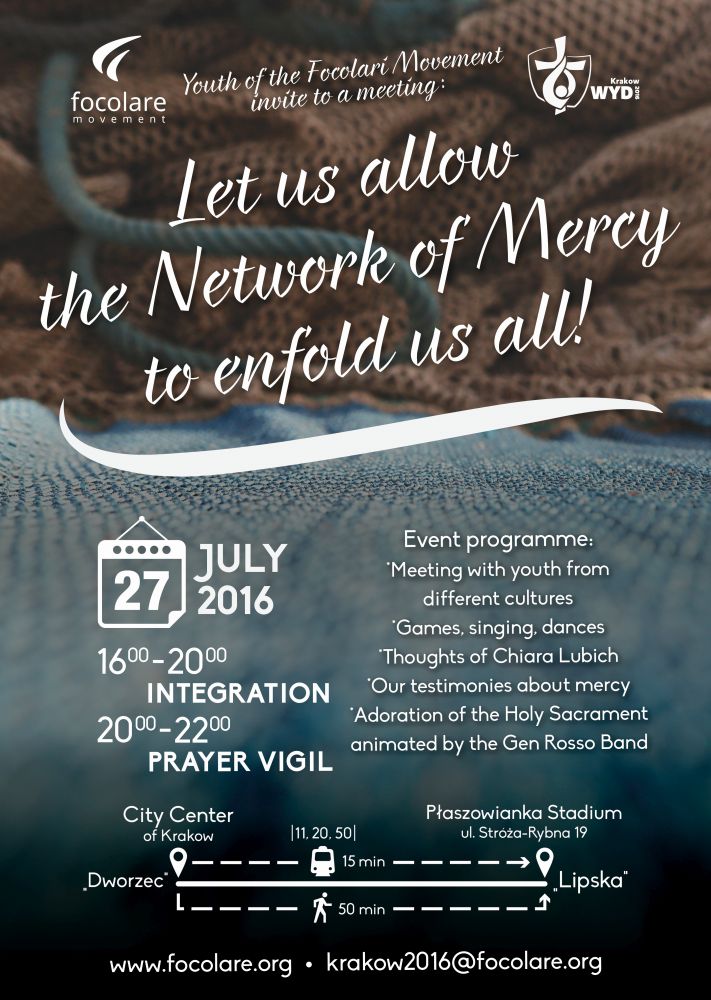
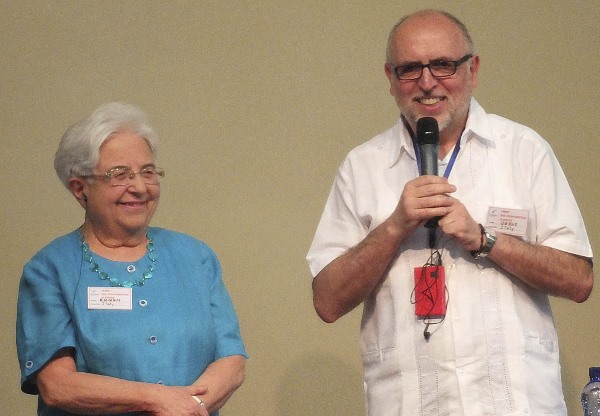
May 25, 2016 | Focolare Worldwide
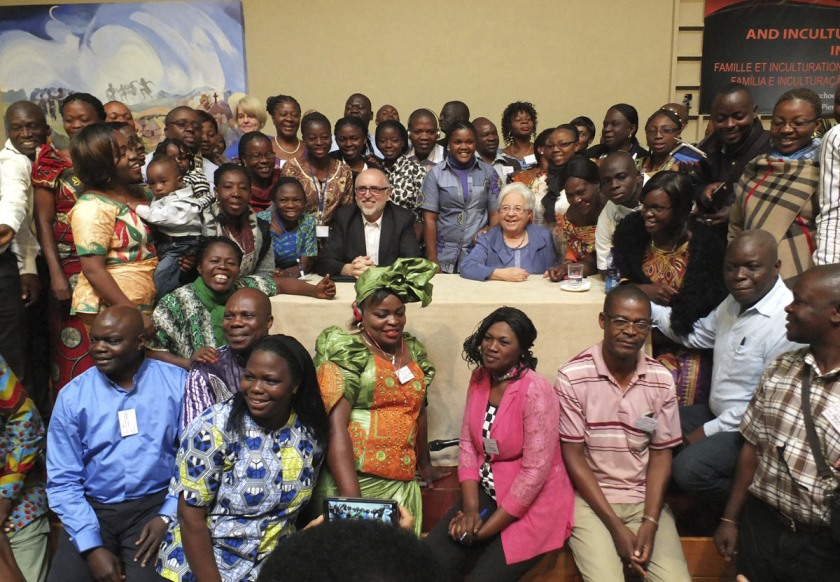 When asked about her thoughts on inculturation today Maria Voce responded: “It’s the incarnation of the light of the Gospel in the African cultures,” She was addressing an audience of 350 people who were attending the School of Inculturation held last week at the Focolare’s permanent Mariapolis Piero near Nairobi, Kenya. There was the same joy and enthusiasm as when Chiara Lubich had placed the first stone of that Mariapolis in 1992, and of the School of Inculturation that would later be erected there. The Focolare foundress had imagined a school for across the board dialogue in the permanent Mariapolis, dialogue between the Gospel and the African cultures, a school that would give a new impulse to evangelization. Co-president Jesús Morán went on to say: “’Making yourself one’ (see Cor. 19:22) has Jesus in his abandonment on the cross for its model, when he made himself nothing for humankind, a nothing of love. Like Him, we should also learn to make ourselves one in front of the different cultures, so that we can then experience that this is never a nothingness that nullifies, but only enriches.” For many of those attending the school, this was also their answer to the many challenges that the African continent faces including inculturation. But it is also an answer to the phenomenon of globalization.
When asked about her thoughts on inculturation today Maria Voce responded: “It’s the incarnation of the light of the Gospel in the African cultures,” She was addressing an audience of 350 people who were attending the School of Inculturation held last week at the Focolare’s permanent Mariapolis Piero near Nairobi, Kenya. There was the same joy and enthusiasm as when Chiara Lubich had placed the first stone of that Mariapolis in 1992, and of the School of Inculturation that would later be erected there. The Focolare foundress had imagined a school for across the board dialogue in the permanent Mariapolis, dialogue between the Gospel and the African cultures, a school that would give a new impulse to evangelization. Co-president Jesús Morán went on to say: “’Making yourself one’ (see Cor. 19:22) has Jesus in his abandonment on the cross for its model, when he made himself nothing for humankind, a nothing of love. Like Him, we should also learn to make ourselves one in front of the different cultures, so that we can then experience that this is never a nothingness that nullifies, but only enriches.” For many of those attending the school, this was also their answer to the many challenges that the African continent faces including inculturation. But it is also an answer to the phenomenon of globalization.  “Inculturation is required,” Morán remarked. “By living the Spirituality of Unity we can draw closer to other people’s cultures with respect for their truth, and discover through dialogue the beauty of our differences not only in Africa but everywhere in the world.” Maria Voce went on: “a world with so many problems on its shoulders because of the lack of peace and harmony. . . By ‘making ourselves one’ as deeply as possible, we promote inculturation which can be a process towards reconciliation.” Since its founding twenty four years ago “the school has developed the tools that were first identified when the school began, and they have reached a second generation.” Looking to the future, “we’re moving into a new phase that may lead to further proliferation of the school.” These words by the president sounded like a “call to new awareness and responsibility” as many observed, to continue on the path of inculturation that Chiara had intuited after first coming into contact with the people of Africa in 1960. The Focolare president particularly stressed the understanding Chiara had in 1992 regarding the light of the Gospel as a pure “white light” capable of penetrating and illumining the diverse cultures making them into a reciprocal gift for one another and for the world. Peter from Cameroon remarked: “Maria Voce pointed our hearts to our particular calling to incarnate the Spirituality of Unity that is never imposed, but as Chiara said is a ‘white light’ that illumines. Globalization has become an unstoppable process in which our specific gift is this life of the Gospel.” Nicodème from Burundi: “As I return home I seem to understand that I have to start from myself, living the Gospel in the midst of society and politics and in the conflicts, so that I can be an answer of love to the expectations of so many African countries. We can’t put this off.”
“Inculturation is required,” Morán remarked. “By living the Spirituality of Unity we can draw closer to other people’s cultures with respect for their truth, and discover through dialogue the beauty of our differences not only in Africa but everywhere in the world.” Maria Voce went on: “a world with so many problems on its shoulders because of the lack of peace and harmony. . . By ‘making ourselves one’ as deeply as possible, we promote inculturation which can be a process towards reconciliation.” Since its founding twenty four years ago “the school has developed the tools that were first identified when the school began, and they have reached a second generation.” Looking to the future, “we’re moving into a new phase that may lead to further proliferation of the school.” These words by the president sounded like a “call to new awareness and responsibility” as many observed, to continue on the path of inculturation that Chiara had intuited after first coming into contact with the people of Africa in 1960. The Focolare president particularly stressed the understanding Chiara had in 1992 regarding the light of the Gospel as a pure “white light” capable of penetrating and illumining the diverse cultures making them into a reciprocal gift for one another and for the world. Peter from Cameroon remarked: “Maria Voce pointed our hearts to our particular calling to incarnate the Spirituality of Unity that is never imposed, but as Chiara said is a ‘white light’ that illumines. Globalization has become an unstoppable process in which our specific gift is this life of the Gospel.” Nicodème from Burundi: “As I return home I seem to understand that I have to start from myself, living the Gospel in the midst of society and politics and in the conflicts, so that I can be an answer of love to the expectations of so many African countries. We can’t put this off.”
May 24, 2016 | Non categorizzato
Five hundred young people from around the world will meet online for a World Peace Conference For Young People The idea emerged from the synergy between Living Peace and its peace education projects for children, adolescents and young adults in 113 countries and Peace Pals International, an expression of the World Peace Prayer Society (WPPS), which is associated with the United Nations (UN). The project is supported by Fuji Declaration from Japan and several international organizations. https://www.youtube.com/watch?v=omANVR3qIDI Inspired by the Fuji Declaration, 14 Christian and Muslim speakers from 14 countries took turns online last April 30th to make known their views in favour of peace, which they backed up with concrete experiences of acceptance and reconcilliation that give credibility to their claim that world peace is possible. Edward’s presentation about his exprience of the earthquake was particularly significant. He is a member of the Focolare from the Philippines and was linked from Ecuador where he had had been in direct contact with earthquake victims. Sherook from Syria also offered her testimony about what she was living through in her country. After telling about the situation in Syria, which is still very fragile and dangerous, she was unable to hold back her tears, which produced an enormous impression and feeling of empthy in everyone. Her tears also triggered very touching words and offers of support from two Muslim young people who were online: Omar from Egypt and Abir from Morocco. The conference was an opportunity to present United World Project and its SignUpForPeace inititiative. Jules Lamore, coordinator of Peace Pals International and member on the committee that organizes the events for World Peace Day in the United Nations, telephoned from New York to congratulate us for the online conference. Two young people were awarded scholarships at Miami University of Luxembourg. The General Coordinator of Living Peace, Carlos Palma, was invited to present the conference at the Seat of the European Parliament in Luxembourg during the World Peace Forum on May 24-25, 2016. In 2015 the Luxembourg Peace Prize had been awarded to New Humanity, an NGO of the Focolare Movement. The World Youth Conference of Young People plans on holding four Conferences a years. The next event is planned for June 25, 2016 with young people from movements and organizations that are engaged in peace work. The third edition of the Conference will be held in Florianopolis, Brazil, at the Peace Forum For Young People (September 22-25) during which Peace Pals will present a gift to the city, a peace obelisk. The fourth Conference, on prospects and commitments for the coming year, is scheduled for December 2016.
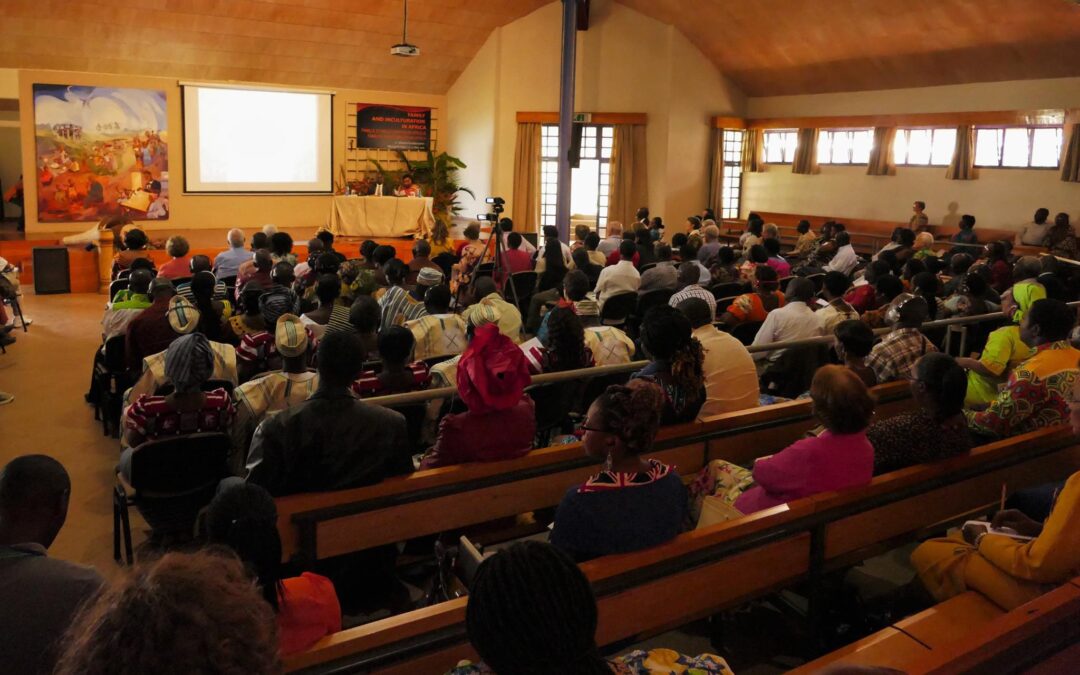
May 23, 2016 | Focolare Worldwide
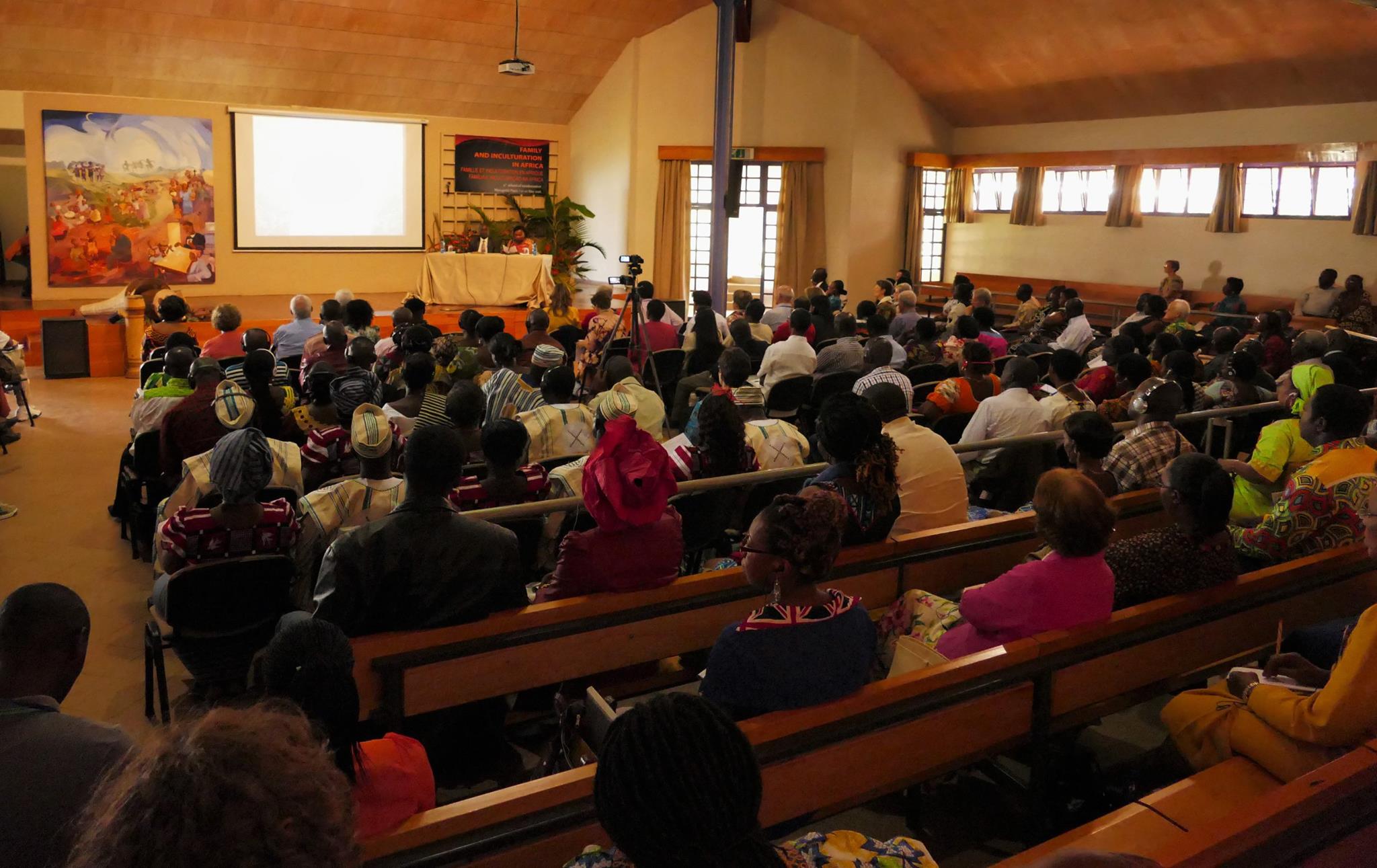 “In our culture,” recounts a Congolese husband after 14 years of marriage, “the first child should be immediately conceived. If after six months a woman still has not conceived, the husband’s family subjects her to stress.” “This is exactly what happened to me – his wife continued. We were already giving half of our salaries to my in-laws who were already in their old age and could no longer work, but this didn’t suffice. They wanted us to have a child who would carry on their lives even after they died. Since nothing happened, my mother-in-law wanted to convince me to go to the quack doctor, and seeing my reluctance, started putting pressure on my husband to ask for a divorce. But he was determined, and though full of respect, told them clearly that he did not give in to their demands because he loved me, and having been married in church, our marriage was “for always.” After three years we decided to adopt two boys, and after 12 years, thanks to a treatment I had in South Africa and our faith in God, we were able to have a daughter, and three months ago, a boy.” “Also my wife,” another Congolese husband continued, “had problems in conceiving. She managed to get pregnant but after a few months would lose the child. Our neighbours said all sorts of things, accusations kindled also by my aunt who did not like my wife. My family had even suggested we make a traditional sacrifice to our ancestors. We explained to them that as Christians, we are not against traditional rites since also in traditions do we find the seeds of the Word, but that we firmly believed in God’s help. One day, a friend of ours, a university professor came to visit, and hearing about our problem, gave us some precious suggestions on how to help the pregnancy progress. Precisely in those days, my wife was five months pregnant, and thanks to his suggestions, her pregnancy continued up to the birth of our child. The same thing happened for the other five children who followed later.” “Upon concluding my studies, “André says, “I found a job in another city, and before leaving, the family got together to give me all the advice they thought I needed. Among these, was that of marrying a girl of my own tribe. I didn’t agree. We had always thought I would marry the one God had planned for me, regardless of where she came from. When I fell in love with Julie, I did not know that she was from a tribe that fought my tribe. I learnt about it later, and it was then that I remembered the instructions of my family. After considerable thought, I understood better what it meant for me to live the Gospel, that is, to succeed in seeing every neighbour not as an enemy, but as a brother, since we are all children of the same Father. So I decided to stick to the principles God had sown in my heart. During our engagement, serious clashes sparked up between our two regions, but Julie and I, despite those difficult times, continued to nurture our relationship until we got married. Our neighbours were certain that our marriage would not last more than six months.” Julie confided: “Even I doubted it would last – but then I saw how faithful André was to me and even if we had different characters, nutritional habits, and mother tongue, we continued to love each other. This year, we celebrated our 23rd wedding anniversary with our four sons. “From the start, each of us had undertaken the commitment to make the other’s family our very own,” André continued, “and with time we managed to get closer to those relatives who initially countered our marriage. In our tradition, giving one’s own name to a child was a demonstration of affection one has for him, a way of immortalizing oneself in him. Julie wanted our sons to have the names of my relatives. With this gesture, also she has been immortalized in my family.”
“In our culture,” recounts a Congolese husband after 14 years of marriage, “the first child should be immediately conceived. If after six months a woman still has not conceived, the husband’s family subjects her to stress.” “This is exactly what happened to me – his wife continued. We were already giving half of our salaries to my in-laws who were already in their old age and could no longer work, but this didn’t suffice. They wanted us to have a child who would carry on their lives even after they died. Since nothing happened, my mother-in-law wanted to convince me to go to the quack doctor, and seeing my reluctance, started putting pressure on my husband to ask for a divorce. But he was determined, and though full of respect, told them clearly that he did not give in to their demands because he loved me, and having been married in church, our marriage was “for always.” After three years we decided to adopt two boys, and after 12 years, thanks to a treatment I had in South Africa and our faith in God, we were able to have a daughter, and three months ago, a boy.” “Also my wife,” another Congolese husband continued, “had problems in conceiving. She managed to get pregnant but after a few months would lose the child. Our neighbours said all sorts of things, accusations kindled also by my aunt who did not like my wife. My family had even suggested we make a traditional sacrifice to our ancestors. We explained to them that as Christians, we are not against traditional rites since also in traditions do we find the seeds of the Word, but that we firmly believed in God’s help. One day, a friend of ours, a university professor came to visit, and hearing about our problem, gave us some precious suggestions on how to help the pregnancy progress. Precisely in those days, my wife was five months pregnant, and thanks to his suggestions, her pregnancy continued up to the birth of our child. The same thing happened for the other five children who followed later.” “Upon concluding my studies, “André says, “I found a job in another city, and before leaving, the family got together to give me all the advice they thought I needed. Among these, was that of marrying a girl of my own tribe. I didn’t agree. We had always thought I would marry the one God had planned for me, regardless of where she came from. When I fell in love with Julie, I did not know that she was from a tribe that fought my tribe. I learnt about it later, and it was then that I remembered the instructions of my family. After considerable thought, I understood better what it meant for me to live the Gospel, that is, to succeed in seeing every neighbour not as an enemy, but as a brother, since we are all children of the same Father. So I decided to stick to the principles God had sown in my heart. During our engagement, serious clashes sparked up between our two regions, but Julie and I, despite those difficult times, continued to nurture our relationship until we got married. Our neighbours were certain that our marriage would not last more than six months.” Julie confided: “Even I doubted it would last – but then I saw how faithful André was to me and even if we had different characters, nutritional habits, and mother tongue, we continued to love each other. This year, we celebrated our 23rd wedding anniversary with our four sons. “From the start, each of us had undertaken the commitment to make the other’s family our very own,” André continued, “and with time we managed to get closer to those relatives who initially countered our marriage. In our tradition, giving one’s own name to a child was a demonstration of affection one has for him, a way of immortalizing oneself in him. Julie wanted our sons to have the names of my relatives. With this gesture, also she has been immortalized in my family.”
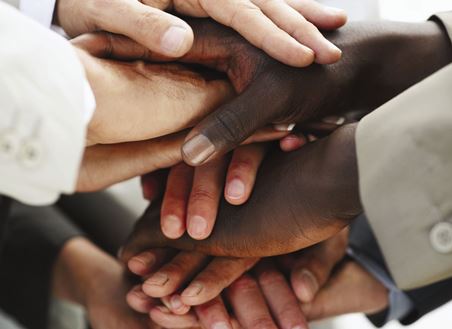
May 22, 2016 | Focolare Worldwide
 In the modern age we see a culture forming that no longer integrates the Gospel. It is a culture of development, scientific and technical progress completely detached from Christian foundations. It is a culture that has created one single and global space for all of humanity to live in. The African culture is not a technological culture, nor the Asian culture, even though Africans and Asians tend toward the same development. But they have different ideas and values. If these different cultures and traditions do not participate in the technological development they cannot survive, they go lost. What can create a non-technical global unity is the Gospel, the co-existence of many cultures in a single world. The Gospel can allow different cultures to enter into a dialogue with one another that makes them develop and change not in a merely exterior manner, but through a dialogue in the one and only truth and in the singular system of Christian values. In this way we salvage both uniqueness and plurality. This is the challenge of today. If we do not do it as Christians we lose an opportunity, we do not face the historic challenge that is being given to us in this moment. Inculturation means taking seriously those values and those human traditions that are everywhere, not to make a museum out of them, not for the sake of a relativism within which each of them can live on, but to create a dialogue in the truth, a truth that can never be imposed but freely offered. The new evangelization is “new” inasmuch as the Christian culture no longer exists. In that same sense it should be an evangelization of those cultures that have not yet experienced a serious encounter with Christianity. And with what force should this take place if not with that “making yourself one” of love which is the same love with which Christ assumed our flesh, our human nature and became one of us [see 1 Cor. 9:22]. The love that led Jesus to become incarnate should urge us to “make ourselves one” with all cultures, without losing the uniqueness of the Gospel. Since the spirituality of the Focolare is all about life and living, it manages to unite beyond the borders and limitations of individual cultures, and it also forms a bond between cultures. It is like a liquid that precisely because it is life, it is assimilated by all types of cultures. If we live the Gospel in its pure state and with self-emptying love, if we lose our cultural roots in order to “make ourselves one” not only with the individual neighbour we have in front of us but also with his culture, then our neighbours can be active and give to us what they possess, and they can offer us their treasures transformed and purified by living the Gospel: values that at the same time illumine and make the Gospel understood. In this white light of the Gospel, I can see the other’s light and give him my light and my culture. We do walk a one-way path: Living in the same world we receive the culture and the Gospel from others and give them our own. The others are involved in the same dynamic of love that is the Good News of the Gospel, that of Jesus which He brought to the earth so that we might live the culture of Heaven already now in this world. (Compiled by German theologian, Wilfried Hagemann, from the biography of Klaus Hemmerle).
In the modern age we see a culture forming that no longer integrates the Gospel. It is a culture of development, scientific and technical progress completely detached from Christian foundations. It is a culture that has created one single and global space for all of humanity to live in. The African culture is not a technological culture, nor the Asian culture, even though Africans and Asians tend toward the same development. But they have different ideas and values. If these different cultures and traditions do not participate in the technological development they cannot survive, they go lost. What can create a non-technical global unity is the Gospel, the co-existence of many cultures in a single world. The Gospel can allow different cultures to enter into a dialogue with one another that makes them develop and change not in a merely exterior manner, but through a dialogue in the one and only truth and in the singular system of Christian values. In this way we salvage both uniqueness and plurality. This is the challenge of today. If we do not do it as Christians we lose an opportunity, we do not face the historic challenge that is being given to us in this moment. Inculturation means taking seriously those values and those human traditions that are everywhere, not to make a museum out of them, not for the sake of a relativism within which each of them can live on, but to create a dialogue in the truth, a truth that can never be imposed but freely offered. The new evangelization is “new” inasmuch as the Christian culture no longer exists. In that same sense it should be an evangelization of those cultures that have not yet experienced a serious encounter with Christianity. And with what force should this take place if not with that “making yourself one” of love which is the same love with which Christ assumed our flesh, our human nature and became one of us [see 1 Cor. 9:22]. The love that led Jesus to become incarnate should urge us to “make ourselves one” with all cultures, without losing the uniqueness of the Gospel. Since the spirituality of the Focolare is all about life and living, it manages to unite beyond the borders and limitations of individual cultures, and it also forms a bond between cultures. It is like a liquid that precisely because it is life, it is assimilated by all types of cultures. If we live the Gospel in its pure state and with self-emptying love, if we lose our cultural roots in order to “make ourselves one” not only with the individual neighbour we have in front of us but also with his culture, then our neighbours can be active and give to us what they possess, and they can offer us their treasures transformed and purified by living the Gospel: values that at the same time illumine and make the Gospel understood. In this white light of the Gospel, I can see the other’s light and give him my light and my culture. We do walk a one-way path: Living in the same world we receive the culture and the Gospel from others and give them our own. The others are involved in the same dynamic of love that is the Good News of the Gospel, that of Jesus which He brought to the earth so that we might live the culture of Heaven already now in this world. (Compiled by German theologian, Wilfried Hagemann, from the biography of Klaus Hemmerle).
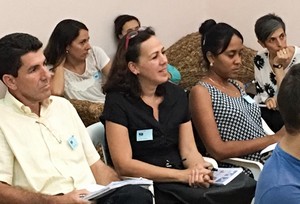
May 21, 2016 | Focolare Worldwide, Senza categoria
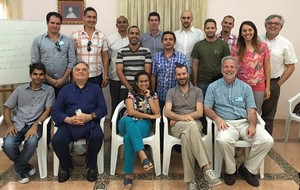 “Although the challenges are many that the Caribbean country has before it, it seemed to me that the Economy of Communion (EoC) was just made for Cuba” said United States EoC business owner John Mundell while speaking at the conclusion of an event on April 29, 2016 in Havana. There were about thirty people including representatives of local cuenta propismo (self employment) training groups, members of discussion teams examining new socio-economic proposals, entrepreneurs, accountants, as well as people with a general interest in the topic. In addition to the aforementioned business owner from Indianapolis and member of the EoC International Commission, there were also representatives from Italy: Gaetano Giunta and Steni di Piazza from the MECC (Microcredito per L’Economia civile e di comunione) , Francesco Tortorella and Francesco Marini of the Projects Sector of Action for a United World (AMU). In his opening address, Apostolic Nuncio, Archbishop Giorgio Lingua recalled the invitation Pope Francis extended to the youth during his visit to the island in September 2015: “Live ‘social friendship’ so that you’ll be able to discern together how to implement it and help others to live for the common good.” “Very appropriate words,” thought Paola Montetta who was one of the organizers of the event, “given that we had Christians and non-believers who had Socialist training, and all of us moved by the desire to live a lifestyle of communion.” After an overview of the Civil Economy, the Economy of Communion (EoC) was presented that included a description of the novelties and challenges it poses, placing the human person at the centre of economic action, particularly the vulnerable and the needy. The experiences of the entrepreneurs from the EoC showed that “despite the pressures, it is possible to pursue a lifestyle of communion in business, respecting the productivity and the environment, while, at the same time, you become generators of reciprocity and communion inside and outside the business.”
“Although the challenges are many that the Caribbean country has before it, it seemed to me that the Economy of Communion (EoC) was just made for Cuba” said United States EoC business owner John Mundell while speaking at the conclusion of an event on April 29, 2016 in Havana. There were about thirty people including representatives of local cuenta propismo (self employment) training groups, members of discussion teams examining new socio-economic proposals, entrepreneurs, accountants, as well as people with a general interest in the topic. In addition to the aforementioned business owner from Indianapolis and member of the EoC International Commission, there were also representatives from Italy: Gaetano Giunta and Steni di Piazza from the MECC (Microcredito per L’Economia civile e di comunione) , Francesco Tortorella and Francesco Marini of the Projects Sector of Action for a United World (AMU). In his opening address, Apostolic Nuncio, Archbishop Giorgio Lingua recalled the invitation Pope Francis extended to the youth during his visit to the island in September 2015: “Live ‘social friendship’ so that you’ll be able to discern together how to implement it and help others to live for the common good.” “Very appropriate words,” thought Paola Montetta who was one of the organizers of the event, “given that we had Christians and non-believers who had Socialist training, and all of us moved by the desire to live a lifestyle of communion.” After an overview of the Civil Economy, the Economy of Communion (EoC) was presented that included a description of the novelties and challenges it poses, placing the human person at the centre of economic action, particularly the vulnerable and the needy. The experiences of the entrepreneurs from the EoC showed that “despite the pressures, it is possible to pursue a lifestyle of communion in business, respecting the productivity and the environment, while, at the same time, you become generators of reciprocity and communion inside and outside the business.”  These are certainly important topics especially in view of promoting possible alternatives to the offensive from capitalism, particularly given the current economic situation in Cuba. The experiences of MECC and AMU in the field of social projects which it promotes around the world, have opened new horizons that make room for important and fruitful dialogue. “The meeting turned out as was hoped: as a multiplier of reciprocity and experiences of communion and as an incubator for ideas and proposals,” said Paolo Monetta. And John Mundell: “During the return trip I was on a plane with a lot of American business people, individually invited for “People To People Travel” – all of them intent on discussing business opportunities that are opening in Cuba. If I’m on a plane filled with American capitalists, I said to myself, then this time the EoC is moving at just the right moment!” The next appointment will be November 2016: “With the goal of involving those who want to create synergies with us in favor of communion and in view of a more just and united world.”
These are certainly important topics especially in view of promoting possible alternatives to the offensive from capitalism, particularly given the current economic situation in Cuba. The experiences of MECC and AMU in the field of social projects which it promotes around the world, have opened new horizons that make room for important and fruitful dialogue. “The meeting turned out as was hoped: as a multiplier of reciprocity and experiences of communion and as an incubator for ideas and proposals,” said Paolo Monetta. And John Mundell: “During the return trip I was on a plane with a lot of American business people, individually invited for “People To People Travel” – all of them intent on discussing business opportunities that are opening in Cuba. If I’m on a plane filled with American capitalists, I said to myself, then this time the EoC is moving at just the right moment!” The next appointment will be November 2016: “With the goal of involving those who want to create synergies with us in favor of communion and in view of a more just and united world.”
May 20, 2016 | Non categorizzato
In Slovakia (Jasná – Demänovská Dolina), 550 young people from around the world, including a group of 50 young people of the Orthodox faith – will come together in order to deepend the themes of World Youth day. Where: Grand Hotel, Demänovská dolina 72, Liptovský Mikuláš, Slovacchia Arrival: 31st July (evening) Departure: 5th August (after breakfast) Participation: 180€ Age group: 16-30 years More information: postgmg2016@focolare.org

May 20, 2016 | Non categorizzato
 At a meeting with young Argentinians in Rio de Janiero, Pope Francis advised: ‘Read the Beatitudes, it will do you good.’ Our task is to re-read the message of the Beatitudes. For three consecutive years, the Pope has chosen for us three out of the eight Beatitudes as the themes for the WYDs. Each one is elaborated on in his addresses, in which he comments on theological matters and gives the youth some tasks for the next year of spiritual work. The choice of Krakow and World Youth Day’s motto lead us to the Spark of Mercy. Since the appearance of Jesus to St. Sister Faustina, Mercy has been radiating from Krakow-Lagiewniki to the whole universal Church. Krakow is widely known as the centre of worship of God’s mercy, and young pilgrims who come will surely want to see the place of the revelations, Sister Faustina’s tomb, and the shrine – the place where St. John Paul II entrusted the world to God’s Mercy. The theme of the XXXI World Youth Day Krakow 2016 is: ‘Blessed are the merciful, for they shall obtain mercy’ (Mt 5:7). Our Holy Father Francis has chosen the fifth of the eight Beatitudes, given by Jesus in his Sermon on the Mount on the shores of the Sea of Galilee, to show the importance of the Beatitudes which are at the heart of Jesus’ teaching. In his first Sermon, Jesus presents us with eight examples of qualities that bring us closer to the Kingdom of God. Among the main events there will be the Opening Mass on the 25th of July, the Welcome Ceremony with the first meeting the Holy Father (28th July), the Way of the Cross with the WYD Cross (29th July), and then the event at the heart of World Youth Day: the Vigil with the Holy Father (30th July) and the Concluding Mass (31st July). The program will also include catechesis in various languages The Youth Festival: a religious, artistic and cultural program takes place in the afternoons and evenings during the three days of catechesis, except during the Main Events. The Youth Festival is composed of open and free initiatives of an artistic, religious and spiritual character. This aspect of WYD gives pilgrims an opportunity to participate in concerts, exhibitions, workshops, sporting events, theatre events and many others. The Youth Festival is prepared for pilgrims, by pilgrims. Everyone has the opportunity to participate not only as a spectator but also as an artist or organizer. The young people of the Focolare Movement will give their contribution towards the preparation of WYD, particularly through an event held during this Festival on 27th July in Krakow, Sports Club Plaszowianka ul. Stroza-Rybna 19 (tram stop 50, 20, 11).
At a meeting with young Argentinians in Rio de Janiero, Pope Francis advised: ‘Read the Beatitudes, it will do you good.’ Our task is to re-read the message of the Beatitudes. For three consecutive years, the Pope has chosen for us three out of the eight Beatitudes as the themes for the WYDs. Each one is elaborated on in his addresses, in which he comments on theological matters and gives the youth some tasks for the next year of spiritual work. The choice of Krakow and World Youth Day’s motto lead us to the Spark of Mercy. Since the appearance of Jesus to St. Sister Faustina, Mercy has been radiating from Krakow-Lagiewniki to the whole universal Church. Krakow is widely known as the centre of worship of God’s mercy, and young pilgrims who come will surely want to see the place of the revelations, Sister Faustina’s tomb, and the shrine – the place where St. John Paul II entrusted the world to God’s Mercy. The theme of the XXXI World Youth Day Krakow 2016 is: ‘Blessed are the merciful, for they shall obtain mercy’ (Mt 5:7). Our Holy Father Francis has chosen the fifth of the eight Beatitudes, given by Jesus in his Sermon on the Mount on the shores of the Sea of Galilee, to show the importance of the Beatitudes which are at the heart of Jesus’ teaching. In his first Sermon, Jesus presents us with eight examples of qualities that bring us closer to the Kingdom of God. Among the main events there will be the Opening Mass on the 25th of July, the Welcome Ceremony with the first meeting the Holy Father (28th July), the Way of the Cross with the WYD Cross (29th July), and then the event at the heart of World Youth Day: the Vigil with the Holy Father (30th July) and the Concluding Mass (31st July). The program will also include catechesis in various languages The Youth Festival: a religious, artistic and cultural program takes place in the afternoons and evenings during the three days of catechesis, except during the Main Events. The Youth Festival is composed of open and free initiatives of an artistic, religious and spiritual character. This aspect of WYD gives pilgrims an opportunity to participate in concerts, exhibitions, workshops, sporting events, theatre events and many others. The Youth Festival is prepared for pilgrims, by pilgrims. Everyone has the opportunity to participate not only as a spectator but also as an artist or organizer. The young people of the Focolare Movement will give their contribution towards the preparation of WYD, particularly through an event held during this Festival on 27th July in Krakow, Sports Club Plaszowianka ul. Stroza-Rybna 19 (tram stop 50, 20, 11).

May 20, 2016 | Focolare Worldwide
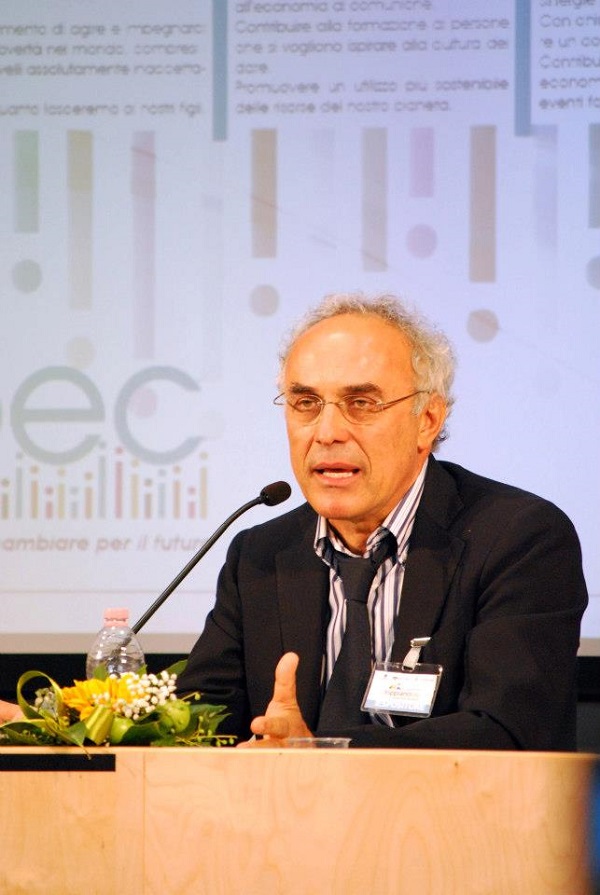 “The inspiration to form the Italian Association of Entrepreneurs for an Economy of Communion (AIPEC), goes back to 2012, during what seemed to be the worst economic crisis in Italy. It was then that a group of businessmen, members of the EoC, felt they had to react. The first step was to see if there were possibilities for their businesses to work with one another. In autumn that year, the memorandum of association was approved, along with the charter and an ethical code. The association immediately proved to be a means for the dissemination of the Economy of Communion.” Upon tracing the association’s origins, Livio Bertola, also illustrated the objectives: “The core values of the association draw inspiration from a “culture of giving.” This is why the shareholders feel the urge not to expect gains for themselves, but to find ways of doing something for the others.” What are the objectives of AIPEC and who does it address? “We are addressing businessmen, freelance professionals, cooperatives and generally, all those who wish to have a people-centred economy: employees, students, housewives, pensioners, unemployed, etc. AIPEC aims to promote the values of the Economy of Communion, and we are trying to do so as best we can: on the one hand, promoting throughout Italy, meetings with people who wish to obtain the utmost from their own work, and organising schools of civil economy with special regard for the young generations; on the other, supporting the activities of associated entrepreneurs, and enhancing the synergies that can be created among them.”
“The inspiration to form the Italian Association of Entrepreneurs for an Economy of Communion (AIPEC), goes back to 2012, during what seemed to be the worst economic crisis in Italy. It was then that a group of businessmen, members of the EoC, felt they had to react. The first step was to see if there were possibilities for their businesses to work with one another. In autumn that year, the memorandum of association was approved, along with the charter and an ethical code. The association immediately proved to be a means for the dissemination of the Economy of Communion.” Upon tracing the association’s origins, Livio Bertola, also illustrated the objectives: “The core values of the association draw inspiration from a “culture of giving.” This is why the shareholders feel the urge not to expect gains for themselves, but to find ways of doing something for the others.” What are the objectives of AIPEC and who does it address? “We are addressing businessmen, freelance professionals, cooperatives and generally, all those who wish to have a people-centred economy: employees, students, housewives, pensioners, unemployed, etc. AIPEC aims to promote the values of the Economy of Communion, and we are trying to do so as best we can: on the one hand, promoting throughout Italy, meetings with people who wish to obtain the utmost from their own work, and organising schools of civil economy with special regard for the young generations; on the other, supporting the activities of associated entrepreneurs, and enhancing the synergies that can be created among them.”  The values of Economy of Communion are expressed in two words that seem to contradict each other … “In effect, the businessmen who join the EoC make a revolutionary choice. The reason why we inserted the preposition “for” is due to the fact that firstly, we are still in the process of building a full communion and none of us has the presumption to feel that we have reached the goal, and secondly, though not less importantly, because Economy of Communion was created for the poor; it is with them that each of the businesses freely shares a part of the corporate profits. This is why we entrepreneurs feel the need to work together by sharing ideas, giving support, paying attention to the others (employees, clients, suppliers, shareholders, or even competitors), and sharing ideas, difficulties and talents. We pay special attention to the businessmen and workers who in these years are suffering the consequences of the economic and social crises.” Who can join your association? “Our network is made up of entrepreneurs and professionals who we define as ordinary partners, and also all the people who want to uphold the values of EoC and who we consider our supporter-partners. You can cooperate with AIPEC also by visiting the site which offers a lot of information on the activities of the association, initiatives and events for information and diffusion. By becoming a supporter, you can become an active part of the projects underway, and also create new projects together.” Any project in the making? “We set an ambitious objective: to spend the next three years from the actual 200 to 6,000 partners! However, personal collaboration and contributions are fundamental, especially of those who already know the EoC and wish to give their time and energy to make the “culture of giving” grow in Italy and throughout the world.”
The values of Economy of Communion are expressed in two words that seem to contradict each other … “In effect, the businessmen who join the EoC make a revolutionary choice. The reason why we inserted the preposition “for” is due to the fact that firstly, we are still in the process of building a full communion and none of us has the presumption to feel that we have reached the goal, and secondly, though not less importantly, because Economy of Communion was created for the poor; it is with them that each of the businesses freely shares a part of the corporate profits. This is why we entrepreneurs feel the need to work together by sharing ideas, giving support, paying attention to the others (employees, clients, suppliers, shareholders, or even competitors), and sharing ideas, difficulties and talents. We pay special attention to the businessmen and workers who in these years are suffering the consequences of the economic and social crises.” Who can join your association? “Our network is made up of entrepreneurs and professionals who we define as ordinary partners, and also all the people who want to uphold the values of EoC and who we consider our supporter-partners. You can cooperate with AIPEC also by visiting the site which offers a lot of information on the activities of the association, initiatives and events for information and diffusion. By becoming a supporter, you can become an active part of the projects underway, and also create new projects together.” Any project in the making? “We set an ambitious objective: to spend the next three years from the actual 200 to 6,000 partners! However, personal collaboration and contributions are fundamental, especially of those who already know the EoC and wish to give their time and energy to make the “culture of giving” grow in Italy and throughout the world.”

 Several concerns were raised during the School of Inculturation, regarding those aspects of the modern world that can overshadow basic African cultural values. Yet, progress and development can never be stopped. In your opinion, what is the way to salvage the values that are contained in the traditions? “I actually think that development can not be avoided. The culture of tradition in African cultures is also always changing. However, modernity does penetrate African traditions with such things as materialism, individualism and the primacy of money and capitalism. I don’t say that money is bad, but the wrong use of money makes us put aside our humanity which in Africa we refer to as ubuntu. But modernity also contains some positive aspects: democracy, human rights, pluralism that leads to the acceptance others and their differences. In some African countries people kill for lack of pluralism; there is a collective sense of self that is very dangerous. In that sense, individualism – a Western value – does not seem entirely negative because if I wish to escape from the collective sense of self, it will take a good dose of individualism. In short, I think there is need for a balance between individualism and pluralism. It’s important to become aware of this and reflect upon it, even though it’s not sufficient in itself.” I think we should illumine the African culture that has been contaminated by the negative values of modernity. I think that this is the point when Christianity must intervene, which looks upon the other person as my path to sanctification. The Gospel invites us to give money the second place. Jesus gives the human person first place, the neigbour. For me this is important, it seems to me the path for salvaging the universal values that are contained in the traditions.” What impressions do you take away with your from these days? What are the challenges to be faced in the daily lives of the African peoples? “Through one simple situation that I found myself in I felt that I could be reborn in these days, like Nicodemus. It was my beginning of the School of Inculturation. The second striking impression was to see the people who are here, to discover that Africa is pluralistic, that there is a pluralism of Africas. I wanted to know every one of them, to understand how they live; to talk with a Cameroonian, who is quite different from a Burundian, a Rwandian, or Ethiopian. Here I experienced Africa’s pluralism. But as Africans, we come together on certain values: solidarity, the family and family relationships, communion, the centrality of our children’s education. This is important for us Afrcicans, even though we are so diverse. For me, the challenge for defeating the internal battles, passes through the incarnation of the words of the Gospel in daily life, social and political life. This is the challenge that rises from these days: When we get home, how will we behave towards people that are different from us? How will we behave towards our enemies? Towards the people who do not belong to my political party, who don’t appreciate me? Will I be capable of loving them? Will I be this pure white light of the Gospel, in society, politics, in the lack of understanding among groups of the same nation? This is the commitment I take away with me: the challenge of our times for overcoming the great problems of Africa.” Compiled by Irena Sargankova
Several concerns were raised during the School of Inculturation, regarding those aspects of the modern world that can overshadow basic African cultural values. Yet, progress and development can never be stopped. In your opinion, what is the way to salvage the values that are contained in the traditions? “I actually think that development can not be avoided. The culture of tradition in African cultures is also always changing. However, modernity does penetrate African traditions with such things as materialism, individualism and the primacy of money and capitalism. I don’t say that money is bad, but the wrong use of money makes us put aside our humanity which in Africa we refer to as ubuntu. But modernity also contains some positive aspects: democracy, human rights, pluralism that leads to the acceptance others and their differences. In some African countries people kill for lack of pluralism; there is a collective sense of self that is very dangerous. In that sense, individualism – a Western value – does not seem entirely negative because if I wish to escape from the collective sense of self, it will take a good dose of individualism. In short, I think there is need for a balance between individualism and pluralism. It’s important to become aware of this and reflect upon it, even though it’s not sufficient in itself.” I think we should illumine the African culture that has been contaminated by the negative values of modernity. I think that this is the point when Christianity must intervene, which looks upon the other person as my path to sanctification. The Gospel invites us to give money the second place. Jesus gives the human person first place, the neigbour. For me this is important, it seems to me the path for salvaging the universal values that are contained in the traditions.” What impressions do you take away with your from these days? What are the challenges to be faced in the daily lives of the African peoples? “Through one simple situation that I found myself in I felt that I could be reborn in these days, like Nicodemus. It was my beginning of the School of Inculturation. The second striking impression was to see the people who are here, to discover that Africa is pluralistic, that there is a pluralism of Africas. I wanted to know every one of them, to understand how they live; to talk with a Cameroonian, who is quite different from a Burundian, a Rwandian, or Ethiopian. Here I experienced Africa’s pluralism. But as Africans, we come together on certain values: solidarity, the family and family relationships, communion, the centrality of our children’s education. This is important for us Afrcicans, even though we are so diverse. For me, the challenge for defeating the internal battles, passes through the incarnation of the words of the Gospel in daily life, social and political life. This is the challenge that rises from these days: When we get home, how will we behave towards people that are different from us? How will we behave towards our enemies? Towards the people who do not belong to my political party, who don’t appreciate me? Will I be capable of loving them? Will I be this pure white light of the Gospel, in society, politics, in the lack of understanding among groups of the same nation? This is the commitment I take away with me: the challenge of our times for overcoming the great problems of Africa.” Compiled by Irena Sargankova






 “In our culture,” recounts a Congolese husband after 14 years of marriage, “the first child should be immediately conceived. If after six months a woman still has not conceived, the husband’s family subjects her to stress.” “This is exactly what happened to me – his wife continued. We were already giving half of our salaries to my in-laws who were already in their old age and could no longer work, but this didn’t suffice. They wanted us to have a child who would carry on their lives even after they died. Since nothing happened, my mother-in-law wanted to convince me to go to the quack doctor, and seeing my reluctance, started putting pressure on my husband to ask for a divorce. But he was determined, and though full of respect, told them clearly that he did not give in to their demands because he loved me, and having been married in church, our marriage was “for always.” After three years we decided to adopt two boys, and after 12 years, thanks to a treatment I had in
“In our culture,” recounts a Congolese husband after 14 years of marriage, “the first child should be immediately conceived. If after six months a woman still has not conceived, the husband’s family subjects her to stress.” “This is exactly what happened to me – his wife continued. We were already giving half of our salaries to my in-laws who were already in their old age and could no longer work, but this didn’t suffice. They wanted us to have a child who would carry on their lives even after they died. Since nothing happened, my mother-in-law wanted to convince me to go to the quack doctor, and seeing my reluctance, started putting pressure on my husband to ask for a divorce. But he was determined, and though full of respect, told them clearly that he did not give in to their demands because he loved me, and having been married in church, our marriage was “for always.” After three years we decided to adopt two boys, and after 12 years, thanks to a treatment I had in 




 “The inspiration to form the
“The inspiration to form the  The values of Economy of Communion are expressed in two words that seem to contradict each other … “In effect, the businessmen who join the EoC make a revolutionary choice. The reason why we inserted the preposition “for” is due to the fact that firstly, we are still in the process of building a full communion and none of us has the presumption to feel that we have reached the goal, and secondly, though not less importantly, because Economy of Communion was created for the poor; it is with them that each of the businesses freely shares a part of the corporate profits. This is why we entrepreneurs feel the need to work together by sharing ideas, giving support, paying attention to the others (employees, clients, suppliers, shareholders, or even competitors), and sharing ideas, difficulties and talents. We pay special attention to the businessmen and workers who in these years are suffering the consequences of the economic and social crises.” Who can join your association? “Our network is made up of entrepreneurs and professionals who we define as ordinary partners, and also all the people who want to uphold the values of EoC and who we consider our supporter-partners. You can cooperate with AIPEC also by visiting the
The values of Economy of Communion are expressed in two words that seem to contradict each other … “In effect, the businessmen who join the EoC make a revolutionary choice. The reason why we inserted the preposition “for” is due to the fact that firstly, we are still in the process of building a full communion and none of us has the presumption to feel that we have reached the goal, and secondly, though not less importantly, because Economy of Communion was created for the poor; it is with them that each of the businesses freely shares a part of the corporate profits. This is why we entrepreneurs feel the need to work together by sharing ideas, giving support, paying attention to the others (employees, clients, suppliers, shareholders, or even competitors), and sharing ideas, difficulties and talents. We pay special attention to the businessmen and workers who in these years are suffering the consequences of the economic and social crises.” Who can join your association? “Our network is made up of entrepreneurs and professionals who we define as ordinary partners, and also all the people who want to uphold the values of EoC and who we consider our supporter-partners. You can cooperate with AIPEC also by visiting the